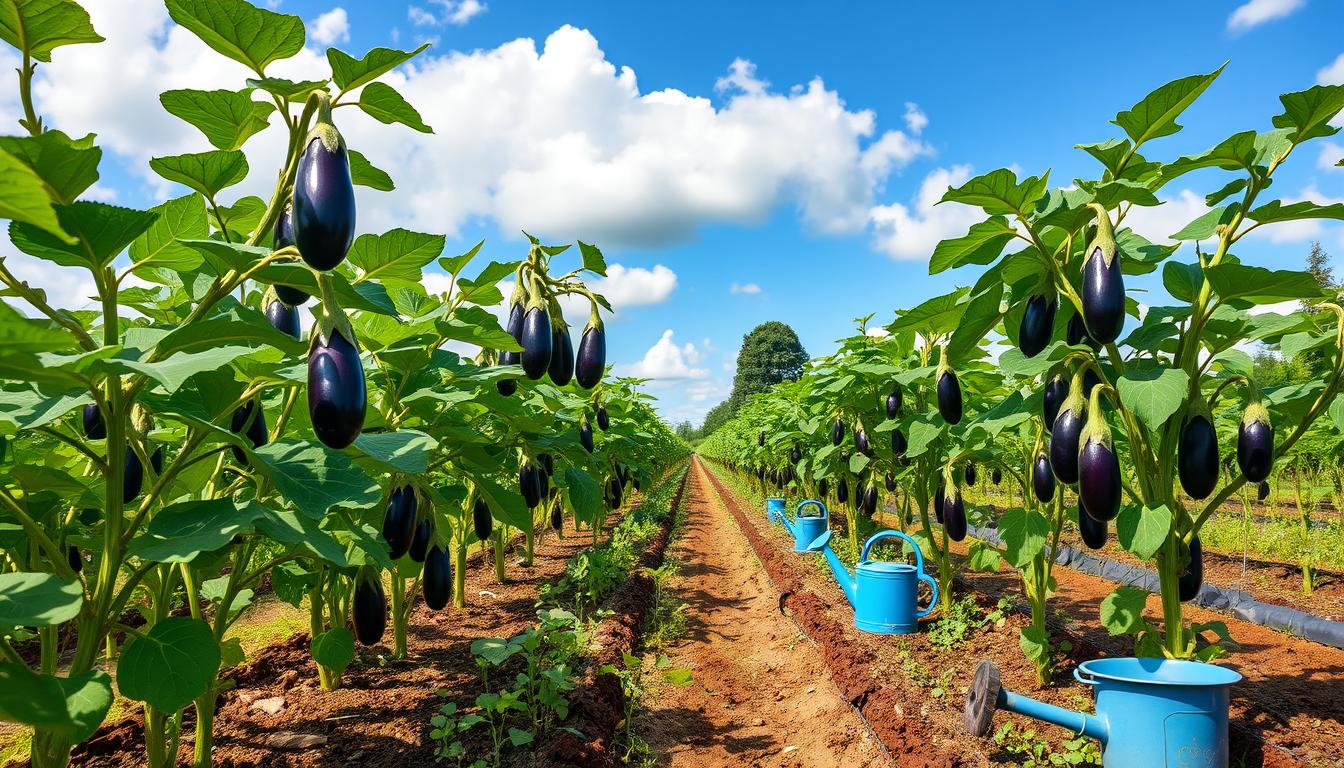To effectively manage pests on your farm, embrace organic pest control methods such as Integrated Pest Management. Focus on cultural controls like crop rotation and companion planting. Use physical barriers and traps to keep pests at bay, while introducing beneficial insects to naturally combat populations. Save chemical methods as a last resort, opting for organic pesticides. By utilizing these diverse strategies, you'll enhance your farm's health and guarantee sustainable practices. There's more to uncover about maximizing effectiveness!
Key Takeaways
- Implement Integrated Pest Management (IPM) by regularly monitoring pest populations and using targeted organic strategies based on damage thresholds.
- Utilize cultural controls like crop rotation and companion planting to disrupt pest life cycles and enhance ecosystem health.
- Incorporate mechanical methods such as insect screens, traps, and barriers to physically deter pests from crops.
- Introduce biological controls by releasing beneficial insects, such as ladybugs, to naturally manage pest populations.
- Reserve chemical interventions as a last resort, opting for organic pesticides like neem oil while adhering to safety practices.
Integrated Pest Management
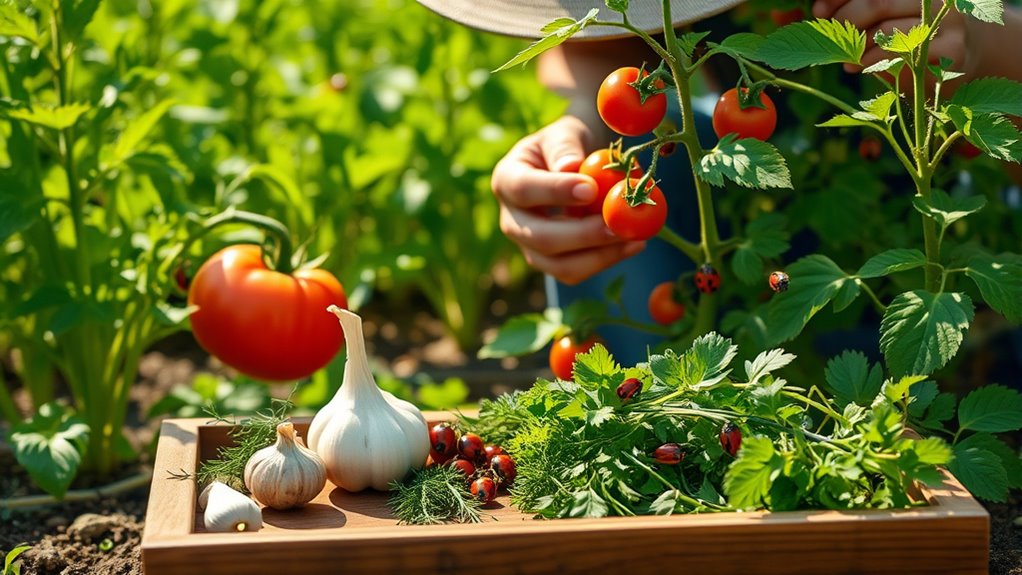
Integrated Pest Management (IPM) offers a smart, systematic approach to handling pests, ensuring you not only protect your plants but also support the environment.
By focusing on identifying pest damage and understanding pest life cycles, you can implement targeted management strategies that utilize organic pest control methods. Regularly monitoring populations allows you to detect issues early, reducing the need for chemical interventions.
You'll establish damage thresholds to determine when action is necessary. Incorporating beneficial insects can naturally control pest populations, promoting a balanced ecosystem.
IPM emphasizes managing pests sustainably, rather than trying to eliminate them completely, which helps prevent pesticide resistance and fosters ecological harmony.
Adopting these practices can lead to healthier crops and a thriving environment.
Cultural Control

Cultural control methods play a vital role in pest management by promoting healthy soil and plant ecosystems.
By focusing on these techniques, you can effectively reduce pest populations and enhance crop health. Here are three key strategies to implement:
- Crop Rotation: Alternating different crops each year disrupts pest life cycles, preventing buildup and targeting of specific plants.
- Companion Planting: Pairing plants like marigolds and basil helps repel pests while attracting beneficial insects, boosting biodiversity.
- Hygiene Practices: Keeping your tools and equipment sanitized prevents the introduction and spread of pests and diseases on your farm.
Mechanical and Physical Controls

When it comes to managing pests effectively, mechanical and physical controls offer straightforward solutions that can safeguard your crops.
You can use physical barriers like insect screens, floating row covers, and mulches to keep pests at bay and protect your plants from environmental stressors.
Trapping methods, such as sticky traps and pheromone traps, help monitor and reduce pest populations before they cause damage.
Don't forget about fences and chicken wire—they're great for deterring larger pests like deer and rabbits.
Regularly clearing debris and weeds from your garden eliminates potential breeding grounds.
Plus, incorporating companion plants, like marigolds, can naturally repel harmful nematodes and attract beneficial insects, enhancing your overall pest management strategy.
Biological Controls
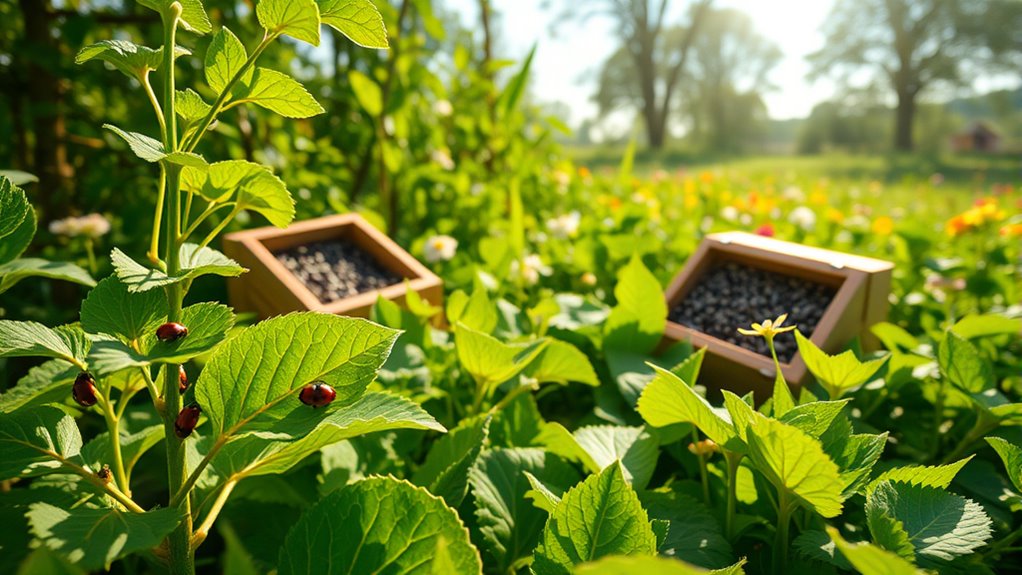
While mechanical and physical controls lay a solid foundation for pest management, biological controls take it a step further by harnessing nature's own defenses.
Biological controls enhance pest management by utilizing nature's own predators for effective and sustainable solutions.
By introducing natural predators, you can effectively manage pest populations without synthetic chemicals. Here are some effective organic methods:
- Beneficial insects like ladybugs and lacewings feast on aphids, keeping their numbers in check.
- Parasitoids such as parasitic wasps lay eggs on pests, allowing the larvae to develop and eliminate the host.
- Beneficial nematodes target soil-dwelling pests, promoting healthier root systems for your crops.
Chemical Controls
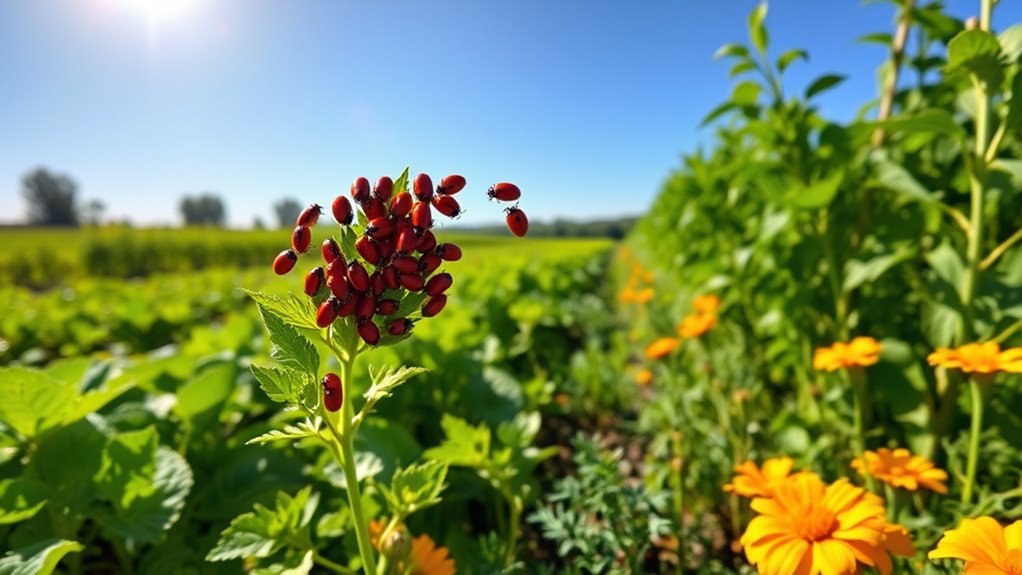
When it comes to pest control, chemical methods should be your last resort.
If you decide to use synthetic pesticides, make sure you follow the label instructions carefully to protect beneficial organisms and the environment.
Last Resort Strategy
Considering the potential risks to both the environment and human health, chemical controls should only be your last resort in pest management.
Before resorting to these methods, verify you've thoroughly implemented cultural, mechanical, and biological strategies.
If you find yourself in a situation where chemical controls are necessary, keep these points in mind:
- Use organic pesticides like neem oil for targeted action on pest populations, minimizing harm to beneficial insects.
- Follow label instructions carefully to avoid environmental damage and protect human health.
- Wear personal protective equipment (PPE) to reduce exposure to harmful substances.
Application Precautions Needed
Before you apply any chemical controls, it's crucial to take specific precautions to guarantee both your safety and the environment's well-being. Start by reading the manufacturer's label carefully to verify you're following all safety precautions. Always wear appropriate personal protective equipment (PPE) like gloves, masks, and goggles to shield yourself from harmful chemicals.
Apply chemical controls during calm weather to minimize drift and protect non-target plants and organisms. It's also wise to spray in the early morning or late evening to safeguard beneficial insects and pollinators. Finally, store chemicals securely away from children and pets and dispose of any unused products according to local regulations.
| Precaution | Action Required | Purpose |
|---|---|---|
| Read label | Follow instructions | Verify proper usage |
| Wear PPE | Use gloves, masks, goggles | Protect from exposure |
| Apply during calm weather | Choose appropriate times | Minimize drift |
Barriers to Implementing Organic Pest Control
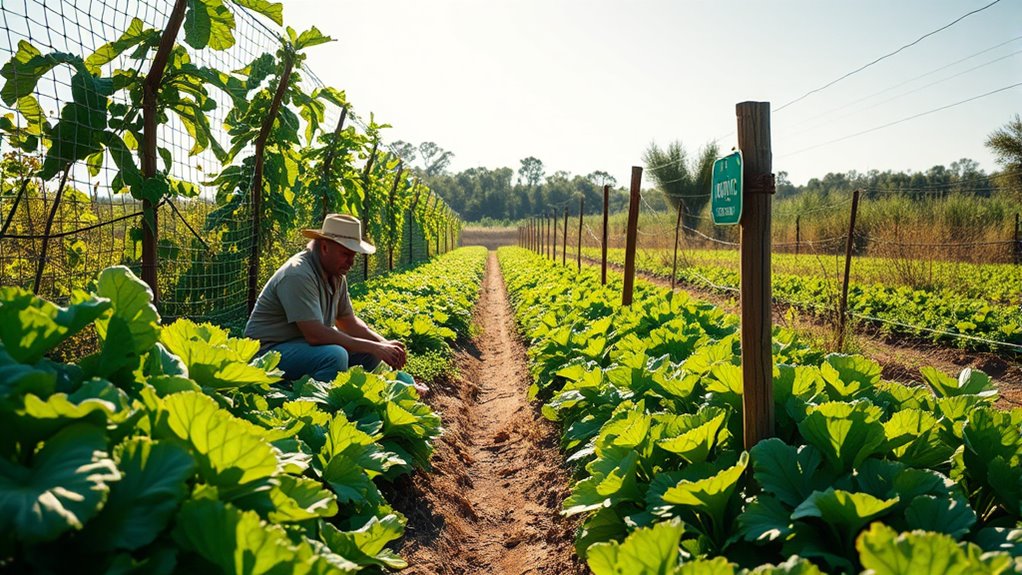
When you consider organic pest control, you might face several challenges that can hinder your success.
The efficacy of these methods can be inconsistent, leading to a slower response in managing pests.
Plus, you'll need to invest significant time and effort, often requiring specialized knowledge that not every farmer has.
Efficacy Challenges
While organic pest control methods offer a sustainable alternative to conventional practices, their efficacy challenges can hinder successful implementation.
You might face several barriers:
- Limited Effectiveness: Organic methods often lead to slow or incomplete pest management, requiring constant monitoring and interventions to achieve the desired results.
- Understanding Pest Biology: Success relies on a deep understanding of pest biology and lifecycle, which can be intimidating for novice growers.
- Access and Cost: Organic pest control products may not always be available or can be more expensive than their conventional counterparts.
These factors can complicate your organic pest management efforts, making it essential to weigh these efficacy challenges against the benefits of sustainable farming practices.
Time and Labor Intensive
Implementing organic pest control methods can be time-consuming and labor-intensive, especially since they often require regular monitoring and manual interventions.
You'll need to invest significant time in methods like companion planting and crop rotation, which demand planning across multiple growing seasons. These strategies can add to your workload, making it challenging to control pests effectively.
Additionally, if some organic methods prove less effective, you may find yourself addressing ongoing pest problems with even more labor. The higher costs associated with organic products can further strain your resources.
While the benefits of organic practices are appealing, the time and effort required can pose significant barriers to their successful implementation on your farm.
Knowledge and Skill Gaps
Understanding the specific life cycles and behaviors of pests is essential for successfully implementing organic pest control methods. Unfortunately, many farmers face knowledge gaps that hinder their effectiveness.
To overcome these barriers, consider the following:
- Education: Seek training in integrated pest management (IPM) techniques to effectively combine various organic approaches.
- Research: Learn about companion planting strategies that can naturally deter pests and enhance crop health.
- Resources: Identify local suppliers for organic pest control products, ensuring you have access to necessary materials.
Best Recommended Organic Pest Control

When it comes to effective organic pest control, combining various methods often yields the best results.
Start with companion planting, like planting marigolds alongside your tomatoes, to deter root-feeding nematodes. This enhances biodiversity while providing natural pest management.
Incorporate physical controls, such as traps or barriers, to protect your crops from pests without chemicals.
Don't forget about neem oil; it's a powerful natural pesticide that disrupts pest life cycles when applied regularly.
Implementing crop rotation also helps by preventing pest populations from building up.
You can further support your efforts by introducing natural predators, like ladybugs, to keep aphids at bay.
Importance of Organic Pest Management
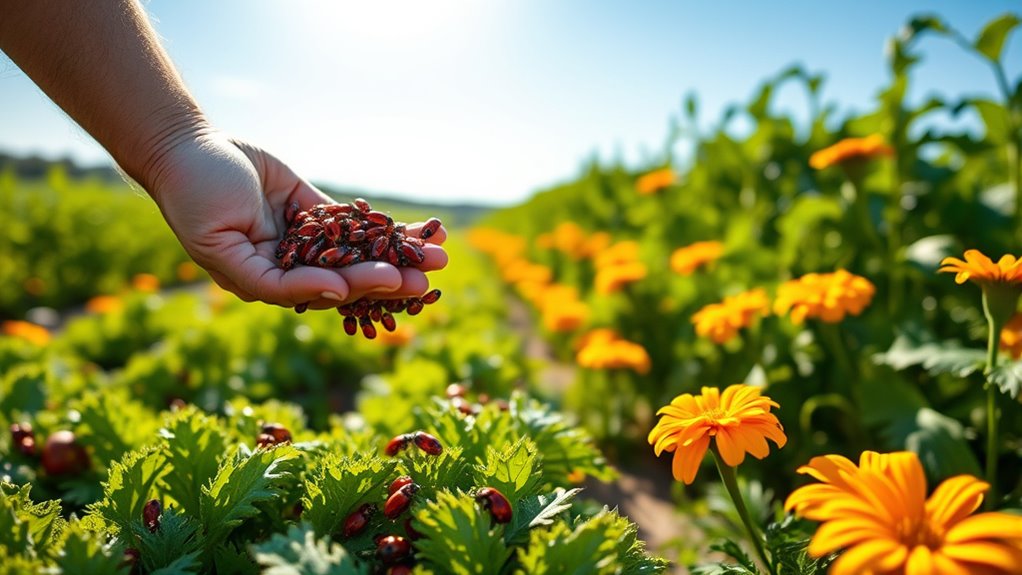
Organic pest management plays an essential role in creating sustainable agricultural practices that benefit both the environment and human health. By minimizing synthetic pesticides, you:
- Protect ecosystems: Encourage biodiversity and reduce harm to beneficial insects.
- Enhance safety: Safeguard human and animal health by limiting exposure to harmful chemicals.
- Promote sustainability: Foster a balanced ecosystem that manages pests and diseases without complete eradication.
Implementing organic practices not only prevents pesticide resistance but also improves crop quality, meeting the demand for sustainably grown produce.
Implementing organic practices enhances crop quality while preventing pesticide resistance, supporting the demand for sustainably grown produce.
By focusing on natural pest control mechanisms, you contribute to a healthier environment and guarantee the longevity of effective pest management strategies on your farm.
Embracing organic methods is a step toward a healthier future for all.
Frequently Asked Questions
What Do Organic Farmers Use for Pest Control?
Organic farmers use a variety of methods for pest control.
You might notice them employing cultural practices like crop rotation to disrupt pest cycles. They often plant companion crops, like marigolds with tomatoes, to deter harmful pests and attract beneficial ones.
Encouraging natural predators, such as ladybugs, is common too.
Plus, they often create homemade organic pesticides using ingredients like soap or neem oil, offering effective alternatives without synthetic chemicals.
What Is the Best Organic Pest Control?
The best organic pest control combines several strategies to effectively manage pests while protecting the environment.
You can implement Integrated Pest Management (IPM), which blends cultural, biological, and mechanical methods.
Crop rotation disrupts pest life cycles, while companion planting utilizes beneficial plant relationships.
Introducing natural predators, like ladybugs, can help too.
Finally, don't forget homemade organic pesticides, such as neem oil mixtures, for accessible and effective pest management solutions tailored to your needs.
What Do Farmers Use Instead of Pesticides?
They say, "An ounce of prevention is worth a pound of cure."
Instead of pesticides, you can use various methods to keep pests at bay. Crop rotation disrupts pest life cycles, while companion planting attracts beneficial insects.
You might introduce natural predators like ladybugs or use homemade organic pesticides, such as neem oil.
How Do Organic Farmers Control Weeds and Pests?
You control weeds and pests through a variety of effective methods.
By rotating crops and using companion planting, you disrupt pest life cycles and boost biodiversity.
You also apply mechanical controls like row covers to prevent pests from reaching your plants.
Introducing natural predators, such as ladybugs, helps keep pest populations in check.
Additionally, you can use homemade organic pesticides and maintain soil health through composting and mulching to support resilient plants.
Conclusion
In the vibrant tapestry of farming, organic pest control methods weave a resilient thread that safeguards your crops and nurtures the earth. By embracing these techniques, you're not just defending your harvest; you're cultivating a thriving ecosystem where harmony reigns. While challenges may loom like dark clouds, your commitment to sustainable practices will shine through. As you sow the seeds of organic management, you'll reap the rewards of a healthier farm and a brighter future for generations to come.






